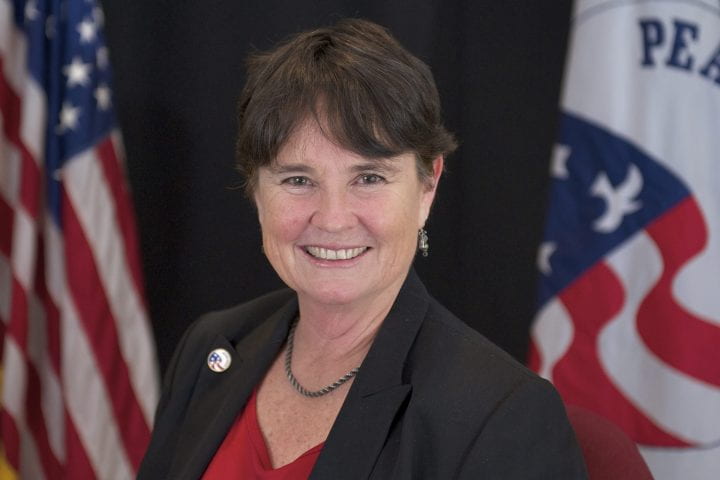Staying true to her corps values
Volunteering around the world, E.B. O’Malley ’78 actively engages in global friendships and the pursuit of peace.

Global peace is more than an abstract concept to Elizabeth O’Malley ’78. Since graduating from UC Irvine with an anthropology degree, she has been fascinated by issues of cultural diversity, social change and how people of different backgrounds can work and thrive together.
O’Malley began her career in Sierra Leone as an agriculture volunteer with the Peace Corps, then headed to Uganda, where – again with the Peace Corps – she developed teacher training programs and healthcare classes for families affected by HIV/AIDS. Most recently, she worked in Austria, coaching organizations on how to leverage Vienna’s multicultural environment and encourage acceptance of diversity in the schools.
Between posts, O’Malley earned a master’s in international public administration and a doctorate in environmental anthropology. Now she has taken all she’s learned to a new level as the Peace Corps’ country director in Tanzania. Here are her thoughts on volunteerism, public service and her experience at UCI.
Q. What kind of training did you get at UCI for all this?
A. I was in the School of Social Sciences, and although there wasn’t an actual anthropology degree offered at that time,
students could work with a professor to design a curriculum focusing on particular interest areas – which would then allow the professor to sign off on a specialized degree. So I was able to get a bachelor’s in anthropology, something I was passionate about.
Q. How did you become involved with the Peace Corps?
A. When I was 8, I sent away for Peace Corps application documents and was disappointed to find out that I had to be 18 to
volunteer and really should have a college degree. After accomplishing that, I finally applied and was sent to Sierra Leone to help people organize to produce the food they needed. The intensity of life, learning a new language, challenging my boundaries, becoming part of a community, and working with farm families to create and store enough food to get through the hungry season each year was life-changing and has informed every step I’ve taken since.
Q. What other Peace Corps assignments have you had?
A. I was country director in Uganda from 2000 to 2005. I reopened the program after it had been closed by civil disturbances. Staff members interact with people from a variety of cultures and subcultures, and I thoroughly enjoyed collaborating with Ugandans who mirrored their country’s struggles and worked together to get beyond the past.
Q. What is the Peace Corps’ role in Tanzania?
A. About 155 volunteers serve in rural Tanzania in secondary math, science and English education; community environmental education; agricultural development; and HIV/AIDS awareness and prevention. They learn Swahili and tend to become very proficient in this significant East African language. Tanzania has a higher-than-average number of volunteers who stay longer than two years. Many find it a rewarding place to live and work.
Q. What is the most important lesson you’ve learned in your career?
A. I’ve learned many new things, but I’m always striving to build on the flexibility and respect for others that I began
practicing in Sierra Leone. Global peace and friendship are real goals that I seek in small steps. They form the basis of the Peace Corps’ organizational mission, and we keep them at the forefront of our interactions with each other, our partners and our hosts.
Q. What would you say to students or alums considering the Peace Corps or other volunteer work?
A. Volunteering is an amazing experience. I would never have had so many opportunities in my career if not for my
experience as a Peace Corps volunteer. It got me a scholarship to graduate school – twice. It got me overseas postings and research fellowships, because the employers and sponsors knew I could hack it. It got me jobs with nongovernmental
organizations in East Africa, because they could be pretty certain I had internalized the benefits of a positive community
development approach. (Of course, this was just my experience; your results may vary!) My time as a volunteer was absolutely full of life – rewards, frustrations, learning and sharing, building friendships that have lasted decades. But
of even more significance is that, while I may have been a volunteer for only two years, I will be a returned Peace
Corps volunteer for the rest of my life. Learning never stops. The challenge of walking and talking global peace and friendship is well worth taking on, and the Peace Corps is a great stop to make along the way.